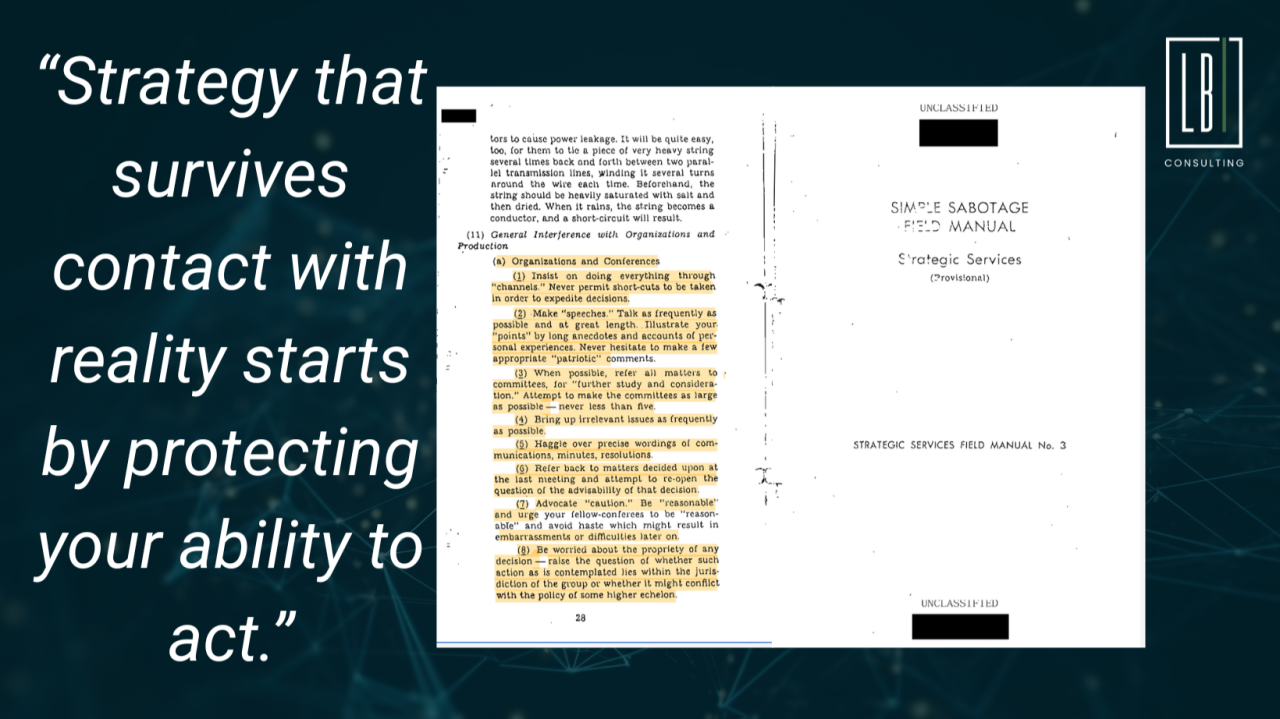
Insights on Strategy, Execution & Complex Organisations
I write about how strategy, execution and organisational design work in real-world environments — the kind that resist simple plans, reward systems thinking, and require leaders to adapt with clarity and purpose. Here you’ll find insights on strategic ambiguity, strategic manoeuvre, organisational viability, decision-making in complexity, and practical leadership thinking.
Browse the latest articles, or explore by topic below.
A Strategy that Survives Contact with Reality Starts by Protecting Your Ability to Act
Most strategies fail because people are boxed in, not because they’re unmotivated
We spend too much time assuming strategy fails because of poor thinking, faulty plans, or lack of buy-in. But more often, strategy fails in execution because, when it meets the real world, the organisation is unable to act.
Not unwilling. Unable.
How strategy execution really fails: Lessons from the CIA's simple sabotage manual.
The real enemy of execution isn't resistance. It's subtle sabotage disguised as regular work.
In 1944, the CIA's predecessor, the OSS, published a field guide to help ordinary citizens sabotage enemy operations from within. The now-declassified Simple Sabotage Field Manual is both darkly comic and brutally insightful.
How Marketing Hijacked Strategy
Why buzzwords don't bring clarity — and what strategy actually demands
When marketing captured strategy, we didn't just reframe the message. We reframed the work.
Strategy became something to be cascaded rather than constructed. It became a narrative exercise. A brand asset. A motivational toolkit for internal engagement.
In that shift, we lost something fundamental: the connection between strategic intent and structural capability.
We were sold the lie that strategy starts with "why." The key to coherence was a compelling narrative.
The Strategic Ambiguity Advantage: Leading Through Intent, Not Instruction
One phrase in boardrooms and strategy offsites worldwide still dominates: “We need clarity.” Clarity of vision, purpose, and strategy. And yet, in a complex and shifting world, pursuing absolute clarity can be a trap.
What if strategic ambiguity isn’t a weakness to be fixed but a strength to be wielded?
Executing strategy in turbulence and uncertainty
The traditional approach assumes stability.
Traditional execution models assume stability. They rely on linear processes, predictable cause-and-effect relationships, and the assumption that organisations can control their external environment.
This may have worked at some point, but with increasing uncertainty and unpredictability, traditional approaches to execution don't just fail; they actively increase fragility.
Rethinking Leadership, Strategy, and Organisational Design: A Year in Reflection
As we close the chapter on 2024, it's essential to acknowledge the turbulence and volatility that defined this year. The relentless pace of change and the unpredictability of events have exposed the inadequacies of traditional approaches to leadership, strategy, and organisational design. For many, this year has been a wake-up call, a clear sign that old models, rooted in assumptions of stability and linearity, no longer suffice.
Traditional approaches don't work: Is it time to rethink our approach to strategic thinking?
Strategic thinking isn't just about setting a direction, it's about choosing paths that allow us to adapt and gain advantage amidst uncertainty. As Heinz von Foerster advises, "I shall act always to increase the total number of choices." This philosophy is invaluable today when resilience and flexibility are essential.
Increasing options offers flexibility and builds a more adaptive and resilient organisation. Expanding the range of possibilities avoids locking ourselves into rigid structures and fixed outcomes. Instead, we foster an environment where options evolve alongside circumstances.
Navigating the Tensions of Leadership in a Complex World
Through my experiences leading in the British Army and consulting for various organisations, I have quickly understood that effective leadership requires constant adaptation and the ability to navigate conflicting demands.
Unfortunately, modern "thought leadership" often seems too narrow and fails to account for the complex factors that shape our reality.
Mike's presentation delves into the complexities of the modern business landscape, sharing insights and approaches that can help leaders navigate challenges effectively.
In complex and high-stakes environments, stability is an illusion. Reflecting on my experiences as a soldier in Afghanistan, this talk explores the challenges of adapting strategy and execution in the face of chaos, risk aversion, and an agile adversary.
Podcasts and Talks.
Apperences from our founder Mike Jones.
Systems Thinking and Strategy for Leaders : Join us for an insightful interview with Mike Jones, founder and director of LBI Consulting, as we dive into the world of systems thinking and strategy.
In this reflective solo episode, Mike Jones steps back from the guest chair to explore a deeper truth: strategy is failing long before execution begins.
Mike sees strategy not as a top-down process, where the wishes of management become the gospel of the employees: strategy emerges from the actions of all. In this process, the Viable System Model is a valuable tool to develop a strategy and Mike explains how.








